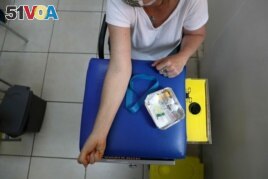29 January 2021
American drugmaker Johnson & Johnson said Friday that its one-shot vaccine prevented COVID-19 in a large trial around the world. The vaccine, however, was less effective in South Africa where a worrisome variant is causing new infections.
The Johnson & Johnson, or J&J, trial involved almost 44,000 volunteers. The company said the vaccine worked best in the United States with an efficacy rate of 72 percent. In Latin America, efficacy was 66 percent. J&J reported that South Africa saw the lowest efficacy rate of the vaccine, at 57 percent.
On Thursday, another American company, Novavax, reported its own COVID-19 vaccine candidate was 89 percent effective among volunteers in Britain. But the results dropped to 49 percent with a smaller group of volunteers in South Africa.
The two-shot vaccines from Pfizer-BioNTech and Moderna were found to be nearly 95 percent effective against COVID-19 in large trials. Those trials, however, were held mainly in the U.S. And they took place before the spread of the new coronavirus variants from Britain, Brazil and South Africa.

FILE - Johnson & Johnson's COVID-19 vaccine clinical trial is under way at a medical facility in Santiago, Chile, Nov. 20, 2020.
Dr. Paul Stoffels is J&J's chief scientific officer. He noted that the World Health Organization considers a one-shot treatment to be the best choice to vaccinate people during a pandemic. Stoffels also pointed to the trial's finding that the vaccine is 85 percent effective in preventing severe COVID-19. This offers "hope of helping ease the huge burden placed on healthcare systems and communities," he said.
Dr. Anthony Fauci is the U.S. government's top infectious disease expert. He said the Johnson & Johnson study was "very encouraging."
At a coronavirus briefing Friday, Fauci called the emerging variants "a wake-up call for all of us." He added that the best way to prevent more coronavirus variants is by "vaccinating as many people as you possibly can."
J&J said it will seek U.S. Food and Drug Administration permission in early February for emergency use of the vaccine. The agency requires a 50 percent or better efficacy rate to be approved for emergency use.
COVID-19 variants
Like other viruses, SARS-CoV-2, the coronavirus that causes COVID-19, is continually changing. Sometimes new variants appear and disappear. Other times, new variants appear and spread across many countries.
Medical experts are especially concerned about the three SARS-CoV-2 variants that came from Britain, Brazil and South Africa. The U.S. government's Centers for Disease Control and Prevention (CDC) says they appear to spread more easily and quickly than other variants.
In Britain, a coronavirus variant known as B.1.1.7 was first recognized in September 2020. It quickly spread throughout the country and now is spreading throughout Europe, the United States and Canada.
The coronavirus variant called P.1 was first identified in four travelers from Brazil who were tested at an airport near Tokyo, Japan in January. It has spread to many countries including Germany, South Korea and the U.S.
In South Africa, another variant called B.1.351 appeared in early October. It has since spread to more than 30 countries including Australia, South Korea and Germany. On Thursday, American health officials reported the appearance of the South African variant in the U.S. They identified two cases in the state of South Carolina. The patients had no links to one another and neither had traveled recently. The experts say this suggests community spread started with a yet unidentified carrier.
At this time, U.S. health agency experts says there is no evidence that new coronavirus variants cause more severe sickness or increased risk of death.
However, scientists have reported that antibodies from a small number of people who had recovered from COVID-19 were less effective against the variant from South Africa. Now, the results from J&J and Novavax trials confirm that current vaccines might be less effective against the South African variant than others.
Both Moderna and Pfizer have since announced they are testing a booster of the approved vaccines against the new variants.
I'm Caty Weaver.
Hai Do wrote this story for Learning English. Caty Weaver was the editor.
________________________________________________
Words in This Story
variant - n. something (the virus) that is different in some way from others of the same kind
burden - n. something that is difficult to deal with
encouraging - adj. causing hopeful feeling
booster - n. something that helps